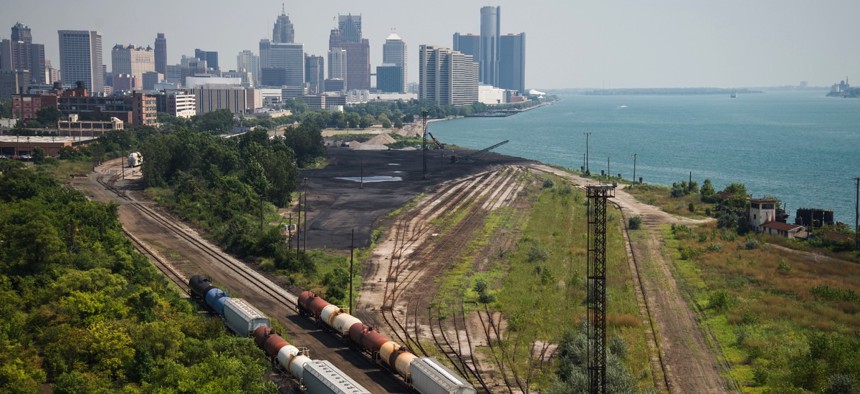Detroit’s Improved Bond Outlook Bodes Well for Municipal Services

Detroit, Michigan Anne Kitzman / Shutterstock.com
Motor City has come a long way from its bankruptcy seven months ago.
Detroit’s been having a good week with credit-rating agency Standard & Poor’s deeming $245 million in municipal bonds “investment grade” Wednesday and Moody’s Investors Service upgrading the city’s issuer rating Thursday.
The Motor City exited the largest case of U.S. municipal bankruptcy seven months ago, and the “A” bonds will be sold to improve Detroit’s police and fire departments and public property.
The stable grade makes the bonds more palatable to investors by lowering their projected interest rate from 5.75 percent to as low as 4.75 percent, Detroit’s finance director, John Naglick, told the Detroit Free Press.
This weekend, Mayor Mike Duggan will no doubt be celebrating the potential reinvestment of $20 million in interest payment savings over the 8- to 15-year life of the bonds:
Balancing Detroit’s budget for the first time in a decade and Michigan granting a statutory lien to city income tax revenue backing its recovery bonds helped secure new ratings. Detroit’s limited tax general obligation bonds were bumped up to “B-”—also stable.
The city’s first foray into public bond markets post-bankruptcy on Aug. 19 could go a long way toward convincing investors it’s credit-worthy, while helping add cops and replace fire equipment.
A day after S&P’s ratings were announced, Moody’s boosted Detroit’s issuer rating from “B2” to “B3”—stable to positive—based on the city’s implicit general obligation unlimited tax pledge. The pending income tax revenue bond issuance had nothing to do with the improvement.
According to Moody’s rating update:
The upgrade to B2 reflects the city's improved financial position following its exit from bankruptcy. The rating also incorporates management's continued improvement of city financial operations and signs of economic development in the city. Offsetting these factors are persistent tax base weakness, with continued population loss and taxable valuation declines that are expected to continue over the near term.
The positive outlook reflects the expectation that the ongoing implementation of new budgeting, operating and economic improvements across the city should continue to benefit the city's economy and finances over the near term.
The rating could continue to improve if Detroit maintains a balanced budget, improves city services and reduces fixed costs as a portion of its budget. Continued tax base declines, an economic downturn, depleted reserves, reduced state oversight and increased fixed costs could hurt the rating.
Among Detroit’s strengths, Moody’s listed the city’s plan for fiscal sustainability, better management and reduced annual long-term retiree benefits over the short to medium term. High unemployment, declining property values, vulnerable reserves and substantial fixed costs as a portion of the municipal budget continue to be challenges for Detroit.
Dave Nyczepir is News Editor for Government Executive’s Route Fifty.
NEXT STORY: USGS Grant to Fund Earthquake Early Warning System Expansion on West Coast







